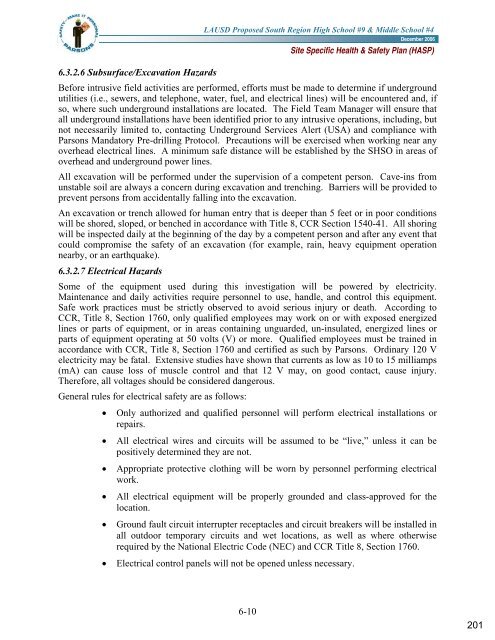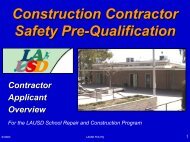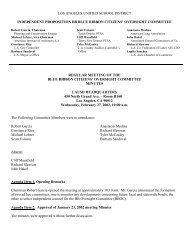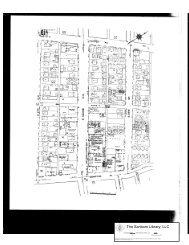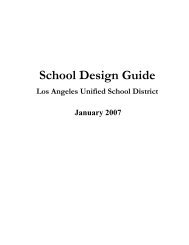Site-Specific Health and Safety Plan (HASP) - Laschools.org
Site-Specific Health and Safety Plan (HASP) - Laschools.org
Site-Specific Health and Safety Plan (HASP) - Laschools.org
Create successful ePaper yourself
Turn your PDF publications into a flip-book with our unique Google optimized e-Paper software.
LAUSD Proposed South Region High School #9 & Middle School #4<br />
6-10<br />
December 2006<br />
<strong>Site</strong> <strong>Specific</strong> <strong>Health</strong> & <strong>Safety</strong> <strong>Plan</strong> (<strong>HASP</strong>)<br />
6.3.2.6 Subsurface/Excavation Hazards<br />
Before intrusive field activities are performed, efforts must be made to determine if underground<br />
utilities (i.e., sewers, <strong>and</strong> telephone, water, fuel, <strong>and</strong> electrical lines) will be encountered <strong>and</strong>, if<br />
so, where such underground installations are located. The Field Team Manager will ensure that<br />
all underground installations have been identified prior to any intrusive operations, including, but<br />
not necessarily limited to, contacting Underground Services Alert (USA) <strong>and</strong> compliance with<br />
Parsons M<strong>and</strong>atory Pre-drilling Protocol. Precautions will be exercised when working near any<br />
overhead electrical lines. A minimum safe distance will be established by the SHSO in areas of<br />
overhead <strong>and</strong> underground power lines.<br />
All excavation will be performed under the supervision of a competent person. Cave-ins from<br />
unstable soil are always a concern during excavation <strong>and</strong> trenching. Barriers will be provided to<br />
prevent persons from accidentally falling into the excavation.<br />
An excavation or trench allowed for human entry that is deeper than 5 feet or in poor conditions<br />
will be shored, sloped, or benched in accordance with Title 8, CCR Section 1540-41. All shoring<br />
will be inspected daily at the beginning of the day by a competent person <strong>and</strong> after any event that<br />
could compromise the safety of an excavation (for example, rain, heavy equipment operation<br />
nearby, or an earthquake).<br />
6.3.2.7 Electrical Hazards<br />
Some of the equipment used during this investigation will be powered by electricity.<br />
Maintenance <strong>and</strong> daily activities require personnel to use, h<strong>and</strong>le, <strong>and</strong> control this equipment.<br />
Safe work practices must be strictly observed to avoid serious injury or death. According to<br />
CCR, Title 8, Section 1760, only qualified employees may work on or with exposed energized<br />
lines or parts of equipment, or in areas containing unguarded, un-insulated, energized lines or<br />
parts of equipment operating at 50 volts (V) or more. Qualified employees must be trained in<br />
accordance with CCR, Title 8, Section 1760 <strong>and</strong> certified as such by Parsons. Ordinary 120 V<br />
electricity may be fatal. Extensive studies have shown that currents as low as 10 to 15 milliamps<br />
(mA) can cause loss of muscle control <strong>and</strong> that 12 V may, on good contact, cause injury.<br />
Therefore, all voltages should be considered dangerous.<br />
General rules for electrical safety are as follows:<br />
• Only authorized <strong>and</strong> qualified personnel will perform electrical installations or<br />
repairs.<br />
• All electrical wires <strong>and</strong> circuits will be assumed to be “live,” unless it can be<br />
positively determined they are not.<br />
• Appropriate protective clothing will be worn by personnel performing electrical<br />
work.<br />
• All electrical equipment will be properly grounded <strong>and</strong> class-approved for the<br />
location.<br />
• Ground fault circuit interrupter receptacles <strong>and</strong> circuit breakers will be installed in<br />
all outdoor temporary circuits <strong>and</strong> wet locations, as well as where otherwise<br />
required by the National Electric Code (NEC) <strong>and</strong> CCR Title 8, Section 1760.<br />
• Electrical control panels will not be opened unless necessary.<br />
201


